If you want the 60 second version of this post that just tells you what to do, click here to skip to the summary.
There is a cheap, widely available, extremely effective treatment for skin aging that has been around for decades and almost no one outside of dermatologists and beauty bloggers seems to know about it.
It's called a retinoid. I first learned about their existence a few months ago after looking in the mirror one day and noticing I was starting to get permanent wrinkles around my mouth. Naturally, I wondered if there was anything I could do to fix them.
An ex of mine was a skincare addict and had perhaps the nicest skin of anyone I have ever met. I texted her to ask for advice and she recommended I use a retinoid.
Since I didn't know what those were or how they worked, I watched a YouTube video. Thus began my 3 month journey down the rabbit hole of skin care product reviews and progress videos. In this post I'll summarize what I've learned.
What are retinoids?
Retinoids are a family of medications derived from vitamin A. In the same way that Ozempic was originally developed as an anti-diabetes drug and later turned out to have a broader set of benefits, retinoids were originally developed to treat acne but turned out to do far more than clear up breakouts.
These effects can be summed up as "improving almost everything about skin". If we had medications that worked as well for other organs as retinoids work for skin, people would probably live well into their hundreds. It's actually kind of remarkable just how well retinoids work.
Exactly HOW retinoids work is a little difficult to describe because they seem to do so many different things. Here's a brief list:
- Retinoids increase collagen production
- They decrease degradation of collagen within the skin
- They protect the extracellular matrix by reducing the activity of metalloproteinases
- They thicken the epidermis, which tends to thin as we age
- They increase the formation of blood veseels, which makes the skin's color look nicer and speeds wound healing
- They increase the levels of fibronectin and tropoelastin, which makes for firmer, bouncier skin
These things just sound kind of vague and boring until you start to look at people who have used retinoids for a long time. Here's a screenshot of "Melissa55" on YouTube, a woman in her late 60s that has been using Retin-A (the first available retinoid) for 28 years.
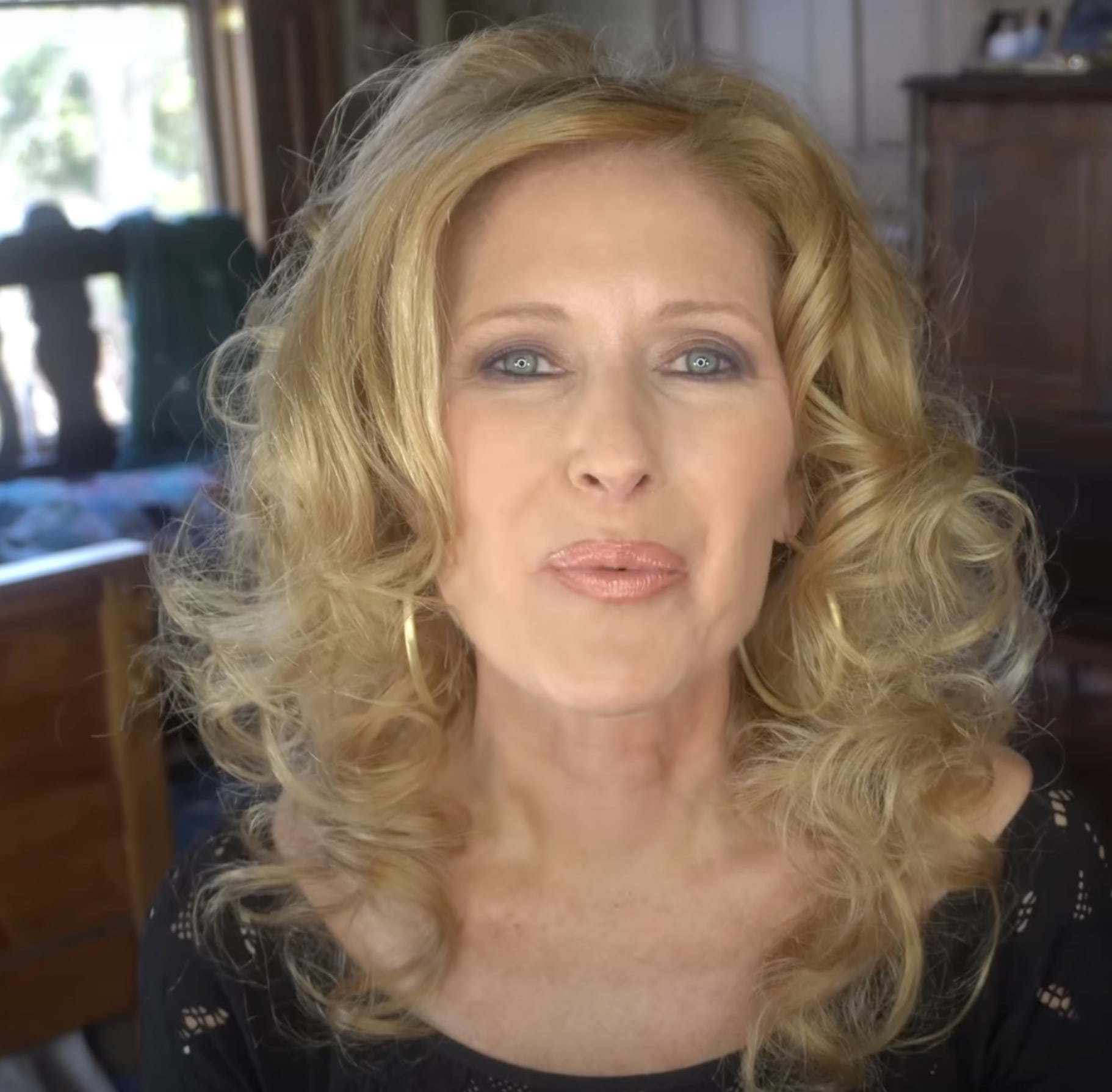
That's already pretty remarkable on its own (most people in their late 60s do not look like Melissa), but what's even MORE remarkable is that retinoids can actually REVERSE skin aging after it has taken place. Here's a couple of before and after pictures of various people who used topical retinoids in a study done back in the 90s.
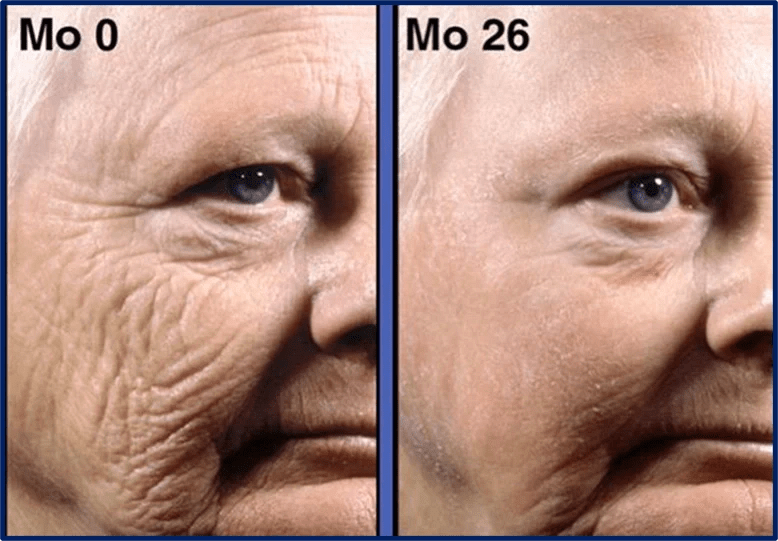
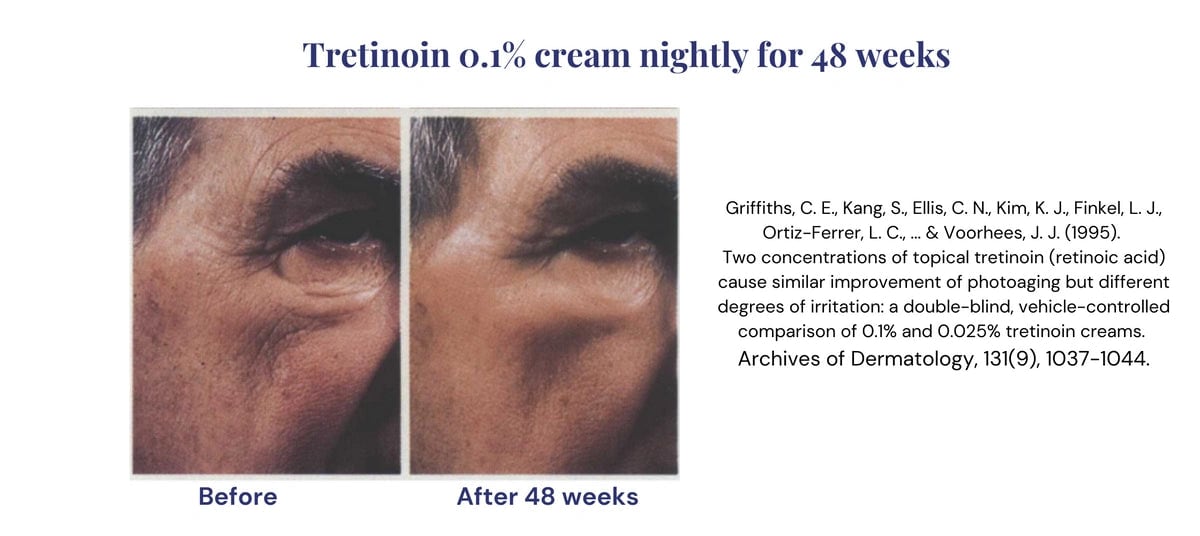
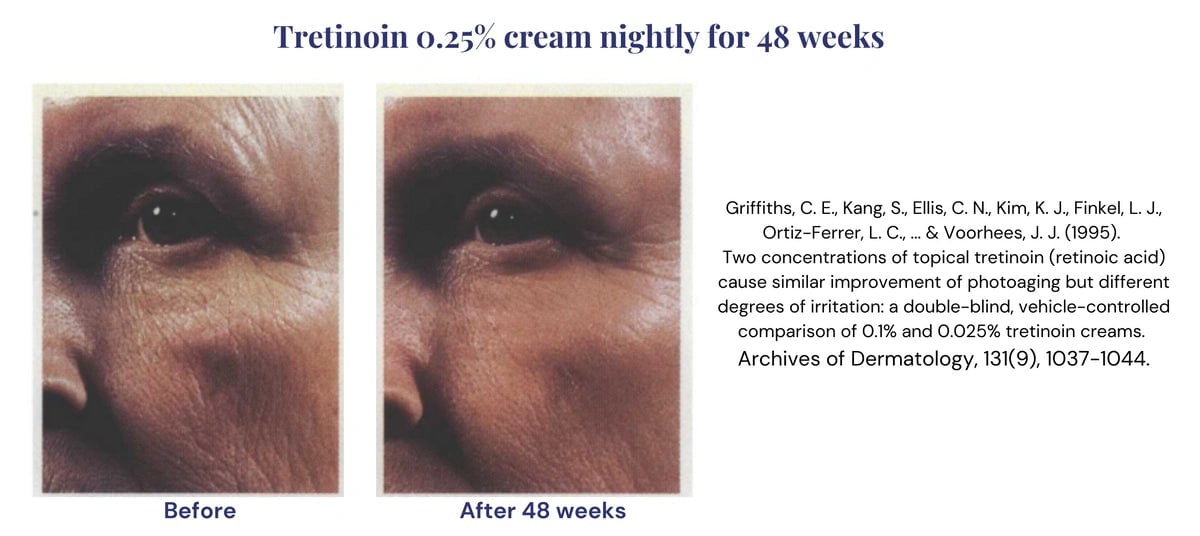
This is in addition to their intended use reducing acne, where they perform quite well.
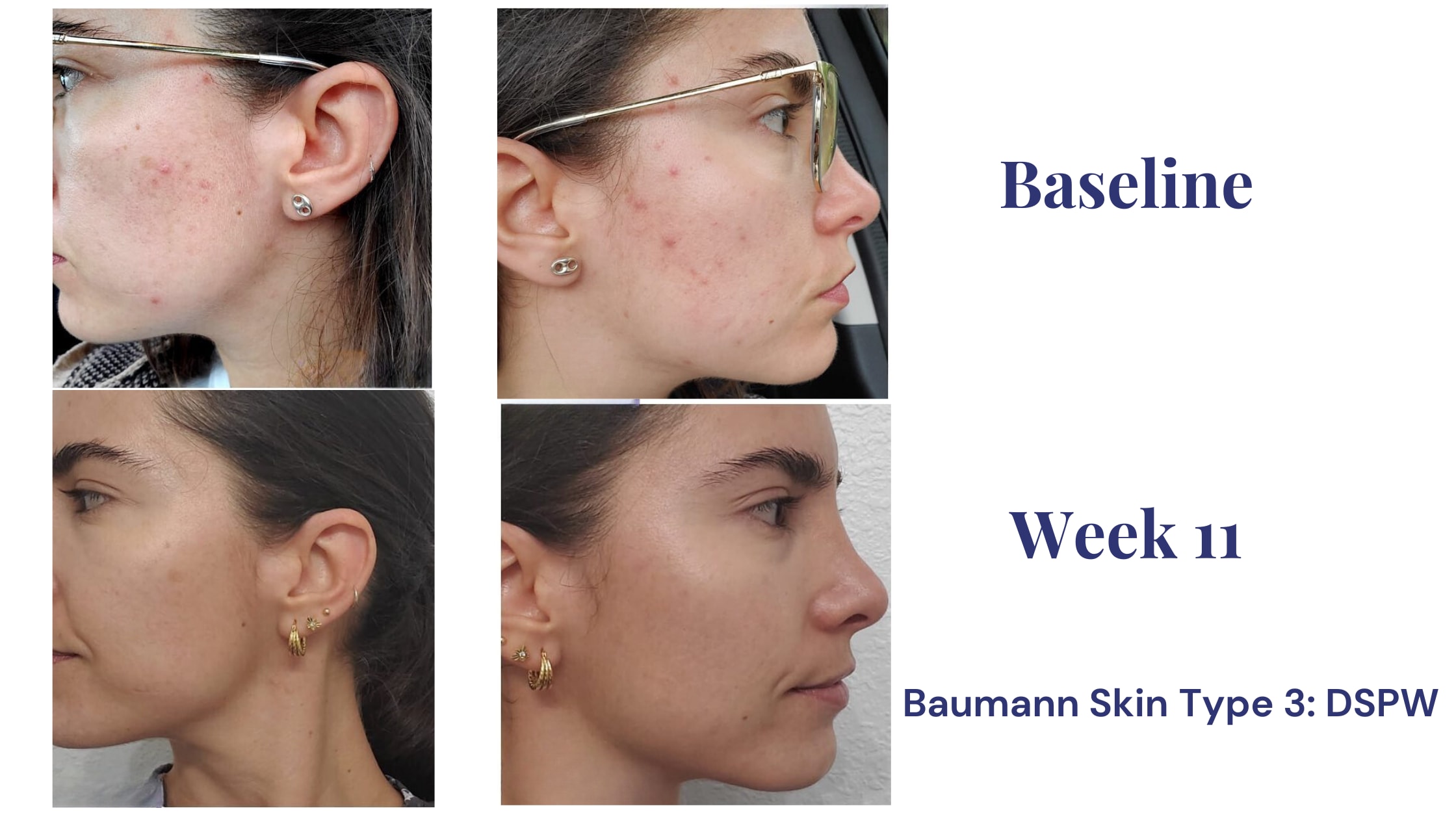
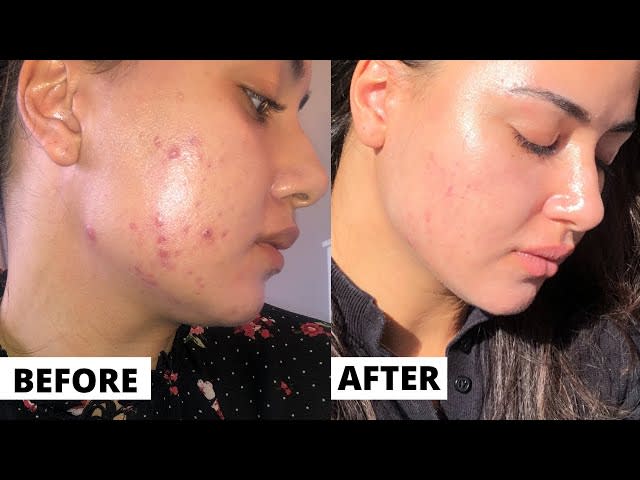
Retinoids don't ALWAYS yeild these kinds of results. You can find many pictures online where people essentially look the same after using them. And you can even find the occasional person whose acne got WORSE with use (though this seems to be pretty rare).
But the vast majority of people see significant visible improvement in the appearance of their skin, and these benefits only increase with time.
Ok, I'm sold. Where do I get a retinoid?
The easiest thing to do here is to just buy adapalene on Amazon. Adapalene is a over-the-counter retinoid which seems to work quite well and generally be well tolerated. You can get enough to apply it to your face every night for about $10-15 per month.
The most potent retinoid is trentinoin, which is the one all the dermatologists recommend. It's the best studied ingredient for anti-aging, seems to penetrate the skin better and reach deeper layers, and overall seems more potent.
Unfortunately it's available only by prescription, so if you want it you'll have to either go to a dermatologist or fill out some forms online. There are a couple of websites websites that do this, but since I haven't used any I can't yet recommend one. I'm currently trying out RedBox since it seems to have very cheap prices and a variety of concentrations and tube sizes.
How to use retinoids
The recommended way to apply adapalene or trentinoin is once per day on the face and/or other affected areas. I put mine on before bed. You just need enough to barely cover all areas of the face, which is generally about this much:
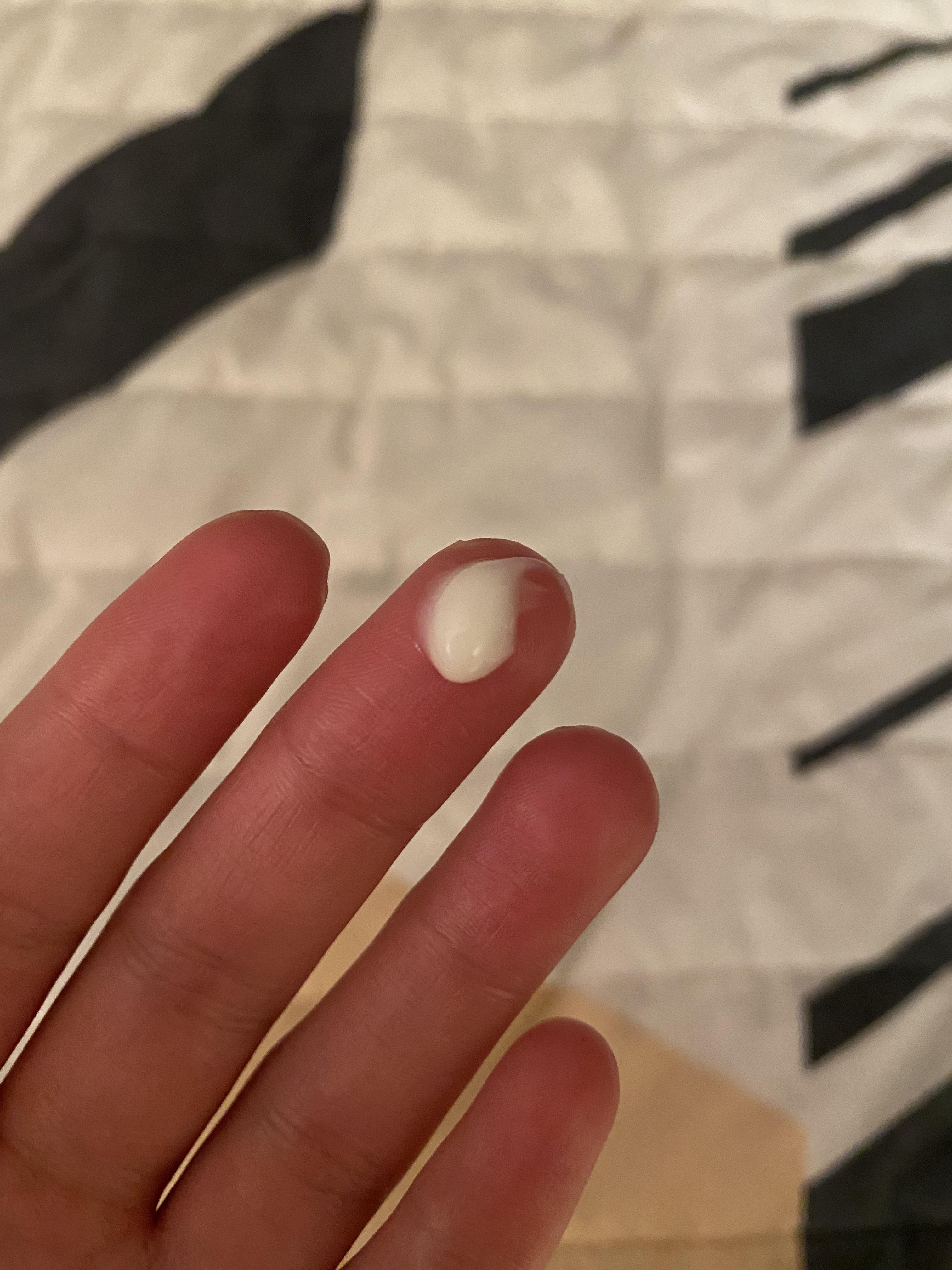
The beauty bloggers like to put little dots of it all over their face and then rub it in to ensure even coverage.
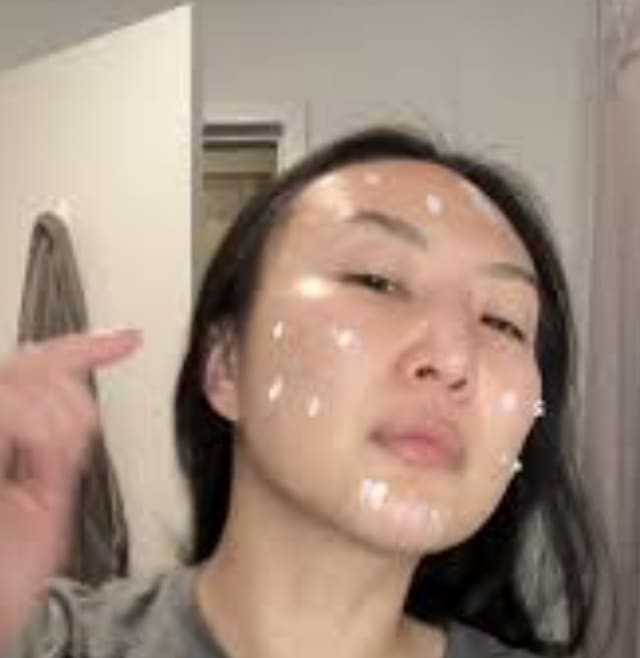
Your skins is supposed to be DRY when you apply, so after you wash your face and use your cleanser, towel off and wait a few minutes for your skin to dry before you apply it.
What else should I know about?
When you first start on a retinoid, it will often cause redness, irritation, skin flakiness, and sometimes even a little miniature breakout of your skin.
These preliminary side-effects are worse if you start with too high of a dose, which is why most people recommend that (at least if you're using trentinoin), you start with a low dose and gradually ramp up. It's generally recommended you start with 0.025%, then move to 0.05% when you have no more redness or flakiness, then eventually to 0.1%.
I didn't really follow this advice when I started on adapalene, and as a result my skin was pretty red and flaky for the few weeks of use. But eventually those side-effects disappeared and the benefits remained.
Lastly, you shouldn’t use Retinoids if you’re pregnant or likely to become pregnant.
Use a cleanser
It's generally recommended that before applying your retinoid, you rinse your face and use a cleanser to remove some of the excess oils and dirt. This is not strictly necessary and you will still see benefits without it, but it's pretty fast and cleansers are cheap so if you want to go the extra mile this is a good thing to do.
Here's a link to a good cleanser on Amazon. You can also get a cleanser at any beauty store and at most pharmacies like Walgreens or CVS.
Use moisturizer
Retinoids tend to dry out the skin. You can counteract this by applying moisturizer after putting it on. Here's what I use (note I am not an expert and it's very plausible that something else will be just as good for less money).
Use Suncreen
Another thing you should know about retinoids is that it's heavily recommended that you wear sunscreen on any region of your body where you've applied it.
I have to be honest; I don't really understand why this advice is so universal; research shows retinoids INCREASE the thickness of the epidermis, so theoretically your basal cells should be MORE protected from the sun not less.
But I've seen this advice absolutely everywhere, so there's probably something I don't understand and you should just follow the standard advice. Also, sunscreen has substantial anti-aging benefits of its own so it's a good idea anyways. If you want a good brand of sunscreen that doesn't make you look like a shiny white Mark Zuckerberg on a surf board, here's the one I use.
That's pretty much it! I wish you the best of luck on your skincare journey!
TL;DR Version
Retinoids are an extremeley effective treatment for both acne and aging, yet few people use them. They can make your skin look significantly better in the short and long term for $10-20/month and 5-10 minutes of effort per day.
The easiest way to get a retinoid is to buy adapalene on Amazon or from a pharmacy like Walgreens. If you want something slightly more effective and have 15 minutes to fill out a form, you can get a prescription for Trentinoin (a more potent and well studied retinoid) online or through your dermatologist.
Apply just enough to cover your face each night (ideally after using a cleanser), then put on moisturizer. In the morning, put on sunscreen to protect your skin, since retinoids will make it burn more easily.
When you say vitamin A, do you literally mean vitamin A, or the similar potential-precursor compound found in plants that is often mistaken as vitamin A? See my other comment.